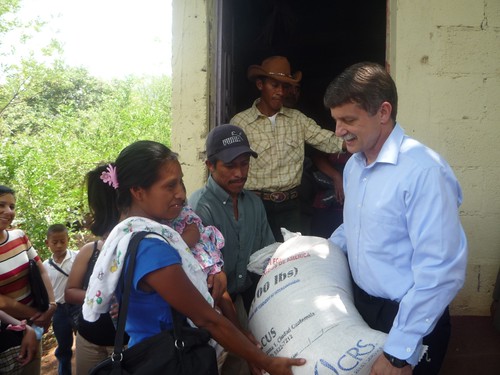
The “dry corridor” in Guatemala suffers from annual drought and food shortages that affect the food security and incomes of people in the region. Last year was worse than most—drought followed by devastating floods caused by tropical storms and rain that destroyed crops, increasing food insecurity and child malnutrition.
Recently, U.S. Ambassador to Guatemala Stephen McFarland and U.S. Agricultural Counselor at the U.S. Embassy Robert Hoff visited some of the poorest communities in one of the dry corridor departments. They wanted to see how a joint USDA-Catholic Relief Services (CRS) food assistance project is helping to address the situation.
“This project is providing monthly food rations for one year to 3,000 families living in 70 communities,” said Hoff. “The rations include corn, beans, and fortified flour that are purchased from Guatemalan producers and suppliers. In exchange for the food, many families are participating in Food for Work activities, such as construction and repair of roads and schools, as well as land reforestation.”

Late last year, USDA awarded $1.75 million to CRS, a private-voluntary organization, to implement this one-year Local and Regional Procurement (LRP) Pilot Project. This LRP pilot project demonstrates the many ways USDA initiatives around the world are feeding those in need, developing agricultural infrastructure, and promoting international food security.
All LRP pilot projects will be independently evaluated to determine the timeliness and efficiency of using LRP as a tool to enhance U.S. government food assistance programs. The findings will be submitted in a formal report to Congress by June 2012.
LRP was authorized as a pilot program under the 2008 Farm Bill. LRP is based on the premise that providing cash grants to purchase food in surplus-producing areas of the country or region where it will be distributed is a more time and cost efficient approach to providing food aid in the aftermath of a natural disaster or other food crisis.
For more information about LRP, please visit our website.
